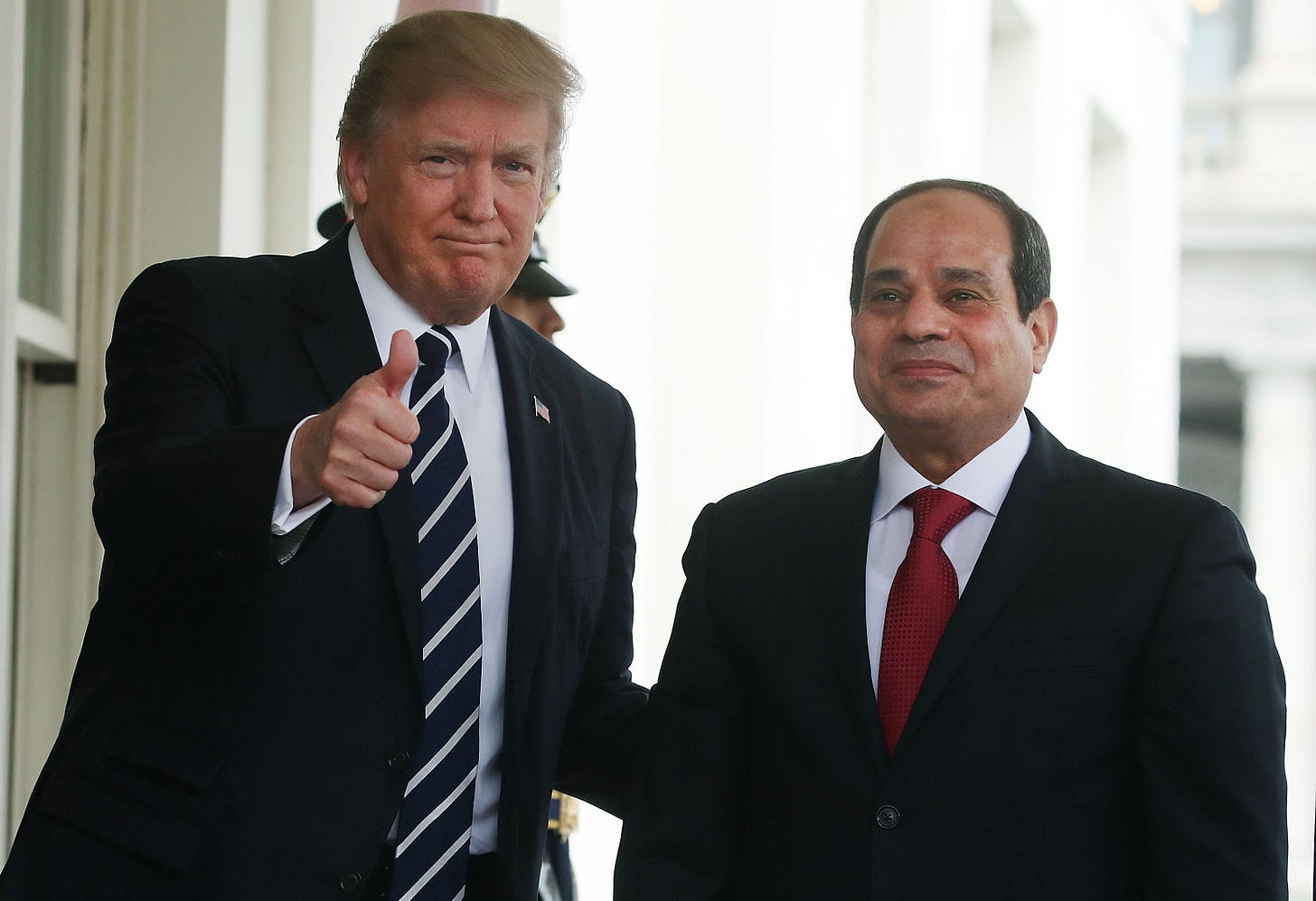Did Trump Take a $10 Million Bribe From Egypt and, If So, What Did Sisi Get in Return?
Unpacking the dangerous ‘bromance’ between Trump and Egyptian dictator Abdel Fattah el-Sisi.

It should have been huge news. Donald Trump’s Justice Department thwarted a federal investigation into an alleged $10 million Egyptian bribe to the Republican president in 2017, the Washington Post reported early last month. The bombshell report, published on Aug. 2, got significant attention on social media, but there was limited coverage in the rest of the mainstream media.
It’s not entirely clear why. The story has all the makings of a colorful drama, not to mention Trump is currently the Republican presidential nominee. Per the Post, less than a week before Trump took office, an organization linked to Egypt’s intelligence service withdrew $10 million from a Cairo bank and placed the cash in two big bags, weighing 200 pounds total.
Federal investigators learned of the withdrawal in 2019, which “intensified a secret criminal investigation that had begun two years earlier with classified U.S. intelligence indicating that Egyptian President Abdel Fatah El-Sisi sought to give Trump $10 million to boost his 2016 presidential campaign,” the Washington Post reported. Such a donation would be illegal under US law, which bars candidates from taking foreign funds.
“Investigators had also sought to learn if money from Sisi might have factored into Trump’s decision in the final days of his run for the White House to inject his campaign with $10 million of his own money,” the Post added. But Trump’s attorney general, Bill Barr, questioned the investigation, and by the summer of 2020, the case was closed due to “a lack of sufficient evidence to prove this case beyond a reasonable doubt,” per the Post.
Perhaps news organizations that chose not to cover nor attempt to follow up on the Post’s reporting saw the alleged incident as too old, or just another Trump scandal with a foreign power. We may never know the truth behind the alleged incident – a Trump campaign spokesperson told the Post the story is “textbook Fake News” and the statute of limitations for illegal campaign contributions has passed. But less than three months out from the election in which Trump is seeking a second term, the Washington Post’s reporting carries significance, particularly when examining the broader foreign policy context at play.
So, what did Egypt's Sisi, who Trump called his "favorite dictator,” get in return for his alleged $10 million bribe?
US-Egypt Relations Pre-Trump
Egypt has been a close US ally for decades, ever since the country made peace with Israel in 1979 – the first Arab state to do so. Since then, the US has given Egypt billions in military aid (the second most after Israel) and had close ties to its ruling generals.
This was disrupted in 2011, when Egypt’s citizens took to the streets in the historic "Arab Spring" and ousted the country’s longtime dictator. Despite early ambivalence, then-President Barack Obama largely backed the democratic uprising and its new Muslim Brotherhood government.
So, when that government was toppled in a coup in the summer of 2013 by Egypt's current leader, General Abdel Fattah el-Sisi, relations soured. Obama spoke out against Sisi's coup, especially after the 2013 Rabaa massacre in which about 1,000 protesters were killed, partially froze US military aid to Egypt, canceled a major joint war game with the country, and never invited Sisi again to the White House. Aid was restored in 2015, but relations remained icy.
Then came the 2016 race between Hillary Clinton and Trump. Clinton was known as a human rights hawk, backing intervention in neighboring Libya a few years earlier. Trump was a self-styled strongman who flirted with dictators worldwide. And Egypt was anxious to shore up ties with the US, especially as Sisi's repression (and economic woes) worsened.
This was the context when Egypt allegedly bribed Trump. The Republican candidate met with Sisi at the UN General Assembly in September 2016, telling him the US would be a "loyal friend" if he won. In October, Trump gave his cash-starved campaign $10 million. And Egypt allegedly repaid him once he was elected via a state bank working through an intelligence cut-out.
The Sisi-Trump “Bromance”
With Trump in office, Sisi began to reap benefits – and the relationship between the two leaders became unusually close – in many ways.



